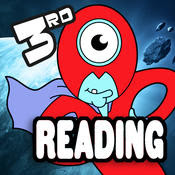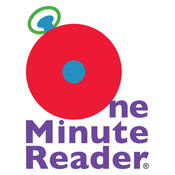3rd Grade Apps that Cover Miscellaneous Reading/Writing Skills:
Apps & Online Tools by 3rd Grade Standard:
3.1 Reading/Beginning Reading Skills/Phonics.
Students use the relationships between letters and sounds, spelling patterns,
and morphological analysis to decode written English.
3.2 Reading/Beginning Reading/Strategies.
Students comprehend a variety of texts drawing on useful
strategies as needed.
3.3 Reading/Fluency.
Students read
grade-level text with fluency and comprehension. Students are expected to read
aloud grade-level appropriate text with fluency (rate, accuracy, expression,
appropriate phrasing) and comprehension.
3.4 Reading/Vocabulary Development.
Students understand new vocabulary and use it when reading and writing.
3.5 Reading/Comprehension of Literary Text/Theme and Genre.
Students analyze, make inferences and draw conclusions
about theme and genre in different cultural, historical, and contemporary
contexts and provide evidence from the text to support their understanding.
3.6 Reading/Comprehension of Literary Text/Poetry.
Students understand, make inferences and draw conclusions about
the structure and elements of poetry and provide evidence from text to support
their understanding. Students are expected to describe the characteristics of
various forms of poetry and how they create imagery (e.g., narrative poetry,
lyrical poetry, humorous poetry, free verse).
3.7 Reading/Comprehension of Literary Text/Drama.
Students understand, make inferences and draw conclusions about the
structure and elements of drama and provide evidence from text to support their
understanding. Students are expected to explain the elements of plot and
character as presented through dialogue in scripts that are read, viewed,
written, or performed.
·
Inference Ace
·
Inference Clues
·
Understanding Inferences Fun Deck
·
If … Then … Fun Deck
·
Robot Rescue Grades 2-3
·
Write About This
·
Educreations
·
ShowMe
3.8 Reading/Comprehension of Literary Text/Fiction.
Students understand, make inferences and draw conclusions about
the structure and elements of fiction and provide evidence from text to support
their understanding.
·
Third Reading Comprehension – English
Fiction
·
3rd Grade Fiction &
Non-fiction Reading Comprehension
·
Inference Ace
·
Inference Clues
·
Understanding Inferences Fun Deck
·
If … Then … Fun Deck
·
Robot Rescue Grades 2-3
·
Popplet
·
Trading Cards
3.9 Reading/Comprehension of Literary Text/Literary Nonfiction.
Students understand, make inferences and draw conclusions
about the varied structural patterns and features of literary nonfiction and
respond by providing evidence from text to support their understanding.
Students are expected to explain the difference in point of view between a
biography and autobiography.
·
Trading Cards
·
3rd Grade Fiction &
Non-fiction Reading Comprehension
·
Who Was? Adventure
·
Biography Comics – who? Great Figures
·
Gameface
·
Frida’s World
3.10 Reading/Comprehension of Literary Text/Sensory Language.
Students understand, make inferences and draw
conclusions about how an author's sensory language creates imagery in literary
text and provide evidence from text to support their understanding. Students
are expected to identify language that creates a graphic visual experience and
appeals to the senses.
·
Inference Ace
·
Inference Clues
·
Understanding Inferences Fun Deck
·
Robot Rescue Grades 2-3
·
If --- Then --- Fun Deck
3.11 Reading/Comprehension of Text/Independent Reading.
Students read independently for sustained periods of
time and produce evidence of their reading. Students are expected to read
independently for a sustained period of time and paraphrase what the reading
was about, maintaining meaning and logical order (e.g., generate a reading log
or journal; participate in book talks).
·
Storia
·
Books on Wheels
·
Epic
·
Tumblebooks.com
3.12 Reading/Comprehension of Informational Text/Culture and History.
Students analyze, make inferences and
draw conclusions about the author's purpose in cultural, historical, and contemporary
contexts and provide evidence from the text to support their understanding.
Students are expected to identify the topic and locate the author's stated
purposes in writing the text.
·
Aesop’s Quest
·
Inference Ace
·
Inference Clues
·
Understanding Inferences Fun Deck
·
Robot Rescue Grades 2-3
·
If --- Then --- Fun Deck
·
One Globe Kids: children’s stories from
around the world
·
Brain Quest Grades 2&3: Wisdom Islands
& Mountain Trek
3.13 Reading/Comprehension of Informational Text/Expository Text.
Students analyze, make inferences and draw
conclusions about expository text and provide evidence from text to support
their understanding.
·
3rd Grade Non-fiction Reading
Comprehension
·
Reading Comprehension: Animals, Grades 2-3
·
3rd Grade Fiction &
Non-fiction Reading Comprehension
·
Main Idea
·
News-O-Matic
·
Weird But True
·
Main Idea – Sentences
·
Main Idea – Short Texts
·
Main Idea by Keith Gardner
·
Space Voyage Grades 2-3
·
Reading Grade 3, Main Idea
·
National Geographic Kids
·
Sports Illustrated Kids
·
Time for Kids
3.14 Reading/Comprehension of Informational Text/Persuasive Text.
Students analyze, make inferences and draw
conclusions about persuasive text and provide evidence from text to support
their analysis. Students are expected to identify what the author is trying to
persuade the reader to think or do.
·
Inference Ace
·
Inference Clues
·
Understanding Inferences Fun Deck
·
Robot Rescue Grades 2-3
·
If --- Then --- Fun Deck
3.15 Reading/Comprehension of Informational Text/Procedural Texts.
Students understand how to glean and use
information in procedural texts and documents.
·
School of Multi-Step Directions
·
Following Directions from I Can Do Apps
·
Fun Deck Following Directions
·
Hearbuilder Following Directions
·
Food Frenzy: Following Directions
·
News-O-Matic
·
Weird But True
·
National Geographic Kids
·
Sports Illustrated Kids
·
Time for Kids
3.16 Reading/Media Literacy.
Students
use comprehension skills to analyze how words, images, graphics, and sounds
work together in various forms to impact meaning. Students will continue to
apply earlier standards with greater depth in increasingly more complex texts.
·
Professor Garfield Forms of Media
·
Venn Diagram
3.17 Writing/Writing Process.
Students
use elements of the writing process (planning, drafting, revising, editing, and
publishing) to compose text.
·
Write about This
·
PhotoCard
·
Popplet
·
ShowMe
·
Educreations
3.18 Writing/Literary Texts.
Students
write literary texts to express their ideas and feelings about real or imagined
people, events, and ideas.
·
Puppet Pals
·
Strip Designer
·
Toontastic Jr.
·
StoryKit
·
Felt Board
·
Write About This
·
Shadow Puppet Edu
·
Videolicious
·
iMovie
·
30 Hands
·
Theme Poem
·
Acrostic Poem
·
Haiku Poem
·
Diamante Poem
3.19 Writing.
Students write about their
own experiences. Students are expected to write about important personal
experiences.
·
Write about This
·
PhotoCard
·
Popplet
·
ShowMe
·
Educreations
3.20 Writing/Expository and Procedural Texts.
Students write expository and procedural or work-related texts to
communicate ideas and information to specific audiences for specific purposes.
·
Write about This
·
PhotoCard
·
Popplet
·
ShowMe
·
Educreations
·
Snap Guide
3.21 Writing/Persuasive Texts.
Students
write persuasive texts to influence the attitudes or actions of a specific
audience on specific issues. Students are expected to write persuasive essays
for appropriate audiences that establish a position and use supporting details.
·
Write about This
·
PhotoCard
·
Popplet
·
ShowMe
·
Educreations
3.22 Oral and Written Conventions/Conventions.
Students understand the function of and use the
conventions of academic language when speaking and writing. Students continue
to apply earlier standards with greater complexity.
·
Daily Sentence Editing Grade 3
·
Bluster!
·
Grammaropolis Complete Edition
·
Grammar for Kids – Parts of Speech (Full
Version)
·
Parts of Speech Machine
·
Regular Past Tense Verbs Fun Deck
·
Irregular Verbs Fun Deck
·
iPractice Verbs
·
Sparklefish
·
Punctuation – End Marks
·
Grammar Wonderland (Elementary)
·
Grammar Jammers Elementary Edition
·
Birds on a Wire: Nouns
·
Adjectives Fun Deck
·
Birds on a Wire: Adjectives
·
Adverbs Fun Deck
·
PrepositionBuilder
·
Prepositions Grammar Quiz Free
·
Sentence Builder
·
Sentence Maker
·
Mad Libs
3.23 Oral and Written Conventions/Handwriting, Capitalization, and Punctuation.
Students write
legibly and use appropriate capitalization and punctuation conventions in their
compositions.
·
Daily Sentence Editing Grade
·
Bluster!
·
Grammaropolis Complete Edition
·
Grammar for Kids – Parts of Speech (Full
Version)
·
Parts of Speech Machine
·
Sparklefish
·
Grammar Wonderland (Elementary)
·
Grammar Jammers Elementary Edition
·
Write About This
·
ShowMe
·
Educreations
3.24 Oral and Written Conventions/Spelling.
Students spell correctly.
·
SpellingCity
·
Spell Mania
·
Spell Grid
·
Hooked on Words
·
Chicktionary
·
Dictionary.com Dictionary & Thesaurus
for iPad
3.25 Research/Research Plan.
Students
ask open-ended research questions and develop a plan for answering them.
·
Popplet
·
PebbleGo.com by Capstone
·
Write About This
3.26 Research/Gathering Sources.
Students determine, locate, and explore the full range of relevant sources
addressing a research question and systematically record the information they
gather.
·
PebbleGo.com
·
National Geographic Kids
·
Write About This
·
ShowMe
·
Educreations
·
TimelineBuilder
·
inBound Kids
·
Graphing for Kids (Chart Maker for children
3.28 Research/Organizing and Presenting Ideas.
Students organize and present their ideas and information according to
the purpose of the research and their audience. Students are expected to draw
conclusions through a brief written explanation and create a works-cited page
from notes, including the author, title, publisher, and publication year for
each source used.
·
ShowMe
·
Educreations
·
Shadow Puppet Edu
·
Videolicous
·
iMovie
·
ChatterPix Kids
·
3o Hands
·
Tellagami
·
Sock Puppets
3.29 Listening and Speaking/Listening.
Students use comprehension skills to listen attentively to others in formal and
informal settings. Students continue to apply earlier standards with greater complexity.
·
School of Multi-Step Directions
·
Following Directions from I Can Do Apps
·
Fun Deck Following Directions
·
Popplet
·
Write About This
3.30 Listening and Speaking/Speaking.
Students speak clearly and to the point, using the conventions of language.
Students continue to apply earlier standards with greater complexity. Students
are expected to speak coherently about the topic under discussion, employing
eye contact, speaking rate, volume, enunciation, and the conventions of language
to communicate ideas effectively.
·
ShowMe
·
Educreations
·
Shadow Puppet Edu
·
Videolicous
·
iMovie
·
ChatterPix Kids
·
Tellagami
·
30 Hands
·
Sock Puppets
·
Audio Memos
3.31 Listening and Speaking/Teamwork.
Students work productively with others in teams. Students continue to apply
earlier standards with greater complexity. Students are expected to participate
in teacher- and student-led discussions by posing and answering questions with
appropriate detail and by providing suggestions that build upon the ideas of
others.
·
Teamwork E-Book
Heather Watson
Watson Works, LLC


















































No comments:
Post a Comment